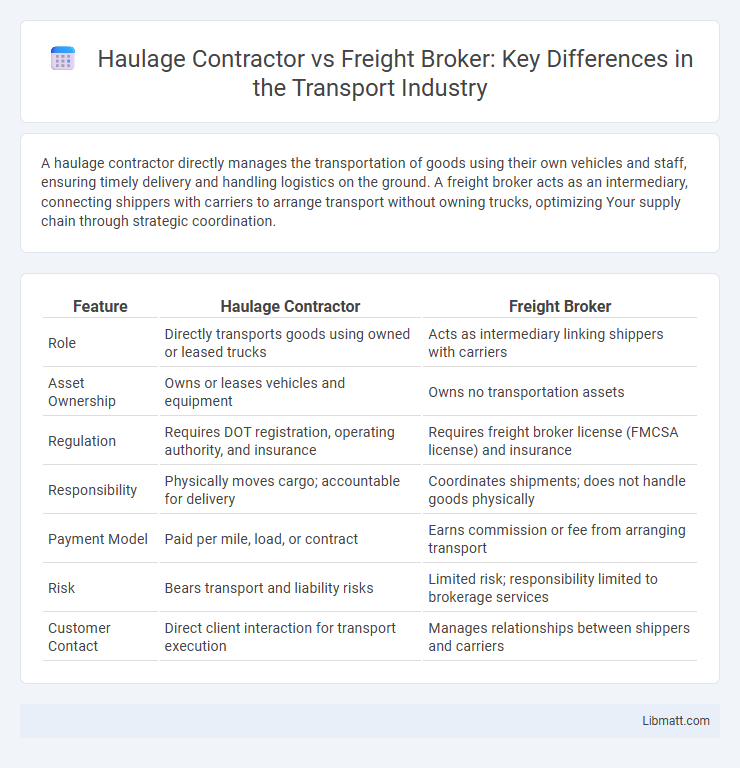A haulage contractor directly manages the transportation of goods using their own vehicles and staff, ensuring timely delivery and handling logistics on the ground. A freight broker acts as an intermediary, connecting shippers with carriers to arrange transport without owning trucks, optimizing Your supply chain through strategic coordination.
Table of Comparison
| Feature | Haulage Contractor | Freight Broker |
|---|---|---|
| Role | Directly transports goods using owned or leased trucks | Acts as intermediary linking shippers with carriers |
| Asset Ownership | Owns or leases vehicles and equipment | Owns no transportation assets |
| Regulation | Requires DOT registration, operating authority, and insurance | Requires freight broker license (FMCSA license) and insurance |
| Responsibility | Physically moves cargo; accountable for delivery | Coordinates shipments; does not handle goods physically |
| Payment Model | Paid per mile, load, or contract | Earns commission or fee from arranging transport |
| Risk | Bears transport and liability risks | Limited risk; responsibility limited to brokerage services |
| Customer Contact | Direct client interaction for transport execution | Manages relationships between shippers and carriers |
Understanding Haulage Contractors
Haulage contractors are responsible for the physical transportation of goods using their own fleet of vehicles, ensuring timely and safe delivery from origin to destination. They handle logistics such as vehicle maintenance, driver management, and route planning, which distinguishes them from freight brokers who act as intermediaries connecting shippers with carriers. Understanding haulage contractors involves recognizing their role in managing the direct movement of cargo, often specializing in specific types of freight or regional routes.
What is a Freight Broker?
A freight broker acts as an intermediary between shippers needing to transport goods and haulage contractors who provide trucking services. They do not own trucks but coordinate logistics to ensure timely and cost-effective delivery by matching your shipment requirements with available carriers. Freight brokers leverage industry connections and technology to optimize routes, negotiate rates, and handle necessary paperwork, streamlining the shipping process for businesses.
Key Differences: Haulage Contractors vs Freight Brokers
Haulage contractors own and operate transportation vehicles, providing direct physical cargo movement services, while freight brokers act as intermediaries connecting shippers with carriers without owning trucks. Contractors assume liability for timely delivery and vehicle maintenance, whereas brokers facilitate contracts and manage logistics coordination. Understanding these distinctions is crucial for businesses selecting transportation solutions, impacting cost, control, and operational responsibility.
Roles and Responsibilities Compared
Haulage contractors manage the physical transportation of goods using their own trucks and drivers, ensuring timely delivery and vehicle maintenance. Freight brokers act as intermediaries, connecting shippers with haulage contractors, negotiating rates, and coordinating logistics without owning transportation assets. Understanding these distinct roles helps you optimize your supply chain by choosing the right partner for direct transport or logistical coordination.
Licensing and Legal Requirements
Haulage contractors must obtain a Motor Carrier (MC) number and comply with Department of Transportation (DOT) regulations, including vehicle safety standards and insurance requirements. Freight brokers require a Freight Broker License from the Federal Motor Carrier Safety Administration (FMCSA), a surety bond or trust fund of $75,000, and must register with the Unified Carrier Registration (UCR) system. Licensing ensures both entities operate legally, but haulage contractors face stricter vehicle compliance rules, while freight brokers emphasize financial responsibility and brokerage agreements.
Cost Structures and Pricing Models
Haulage contractors typically operate with fixed or mileage-based pricing models that cover fuel, labor, vehicle maintenance, and insurance costs, resulting in higher but more predictable expenses. Freight brokers leverage a commission-based pricing structure by acting as intermediaries between shippers and carriers, often securing lower rates through negotiation but adding broker fees. Understanding these cost structures is essential for businesses seeking to optimize logistics budgets and choose between direct transport services and brokered freight solutions.
Client Relationships and Communication
Haulage contractors maintain direct communication with clients, providing hands-on management of transport logistics and immediate updates on shipment status. Freight brokers act as intermediaries, coordinating between clients and various carriers while managing multiple communication channels to ensure seamless service delivery. Strong client relationships for haulage contractors rely on personalized service, whereas freight brokers emphasize efficient coordination and network reliability.
Pros and Cons of Haulage Contractors
Haulage contractors offer direct control over freight transportation, ensuring timely deliveries and accountability through ownership of vehicles and drivers. They can be cost-effective for large or consistent shipments but often require higher upfront investment and maintenance costs. Limited flexibility and geographic reach compared to freight brokers, who rely on third-party carriers, represent notable disadvantages for haulage contractors.
Pros and Cons of Freight Brokers
Freight brokers offer the advantage of connecting shippers with multiple carriers, providing flexibility and access to a vast network without the need to own trucks, which reduces overhead costs. However, relying on brokers can sometimes lead to higher shipping fees and less direct control over the transportation process, potentially affecting delivery reliability. Your decision should weigh the benefits of broad reach and reduced asset management against the risks of variable service quality and cost premiums.
Choosing the Right Solution for Your Business
Selecting the right solution for your business depends on your specific transportation needs and control preferences. Haulage contractors provide direct control over freight movement by managing their own fleet and drivers, ensuring reliability and accountability. Freight brokers act as intermediaries, offering flexibility and access to a broad carrier network, which can optimize costs and expand shipping options for your supply chain.
haulage contractor vs freight broker Infographic

 libmatt.com
libmatt.com